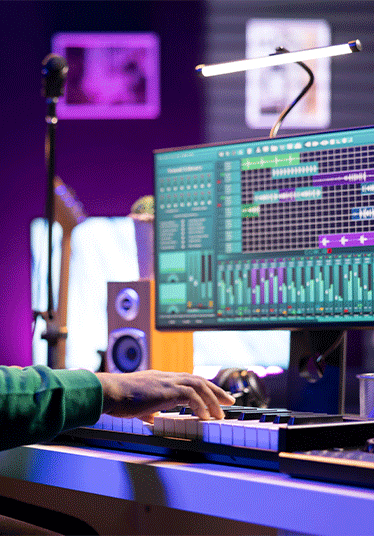The DSP course is ideal for engineers who have studied DSP theory during their undergraduate education and wish to deepen their understanding of how these concepts translate into real-world applications. It bridges the gap between theoretical knowledge and practical implementation, underlying common challenges, limitations, and design trade-offs encountered in practice. However, the module is also well-suited to experienced professionals in hardware or circuit design who are looking to gain a more solid understanding of DSP to develop a more integrated perspective of modern system design—from algorithm to hardware.

Digital Signal Processing CPD
Overview
| Module Code | EEEN40770 |
| Module Title | Digital Signal Processing CPD |
| Subject Area | Electronic Engineering |
| Credits | 10 |
| NFQ | 9 |
| EFQ | 7 |
| Start Date | 10 September 2025 |
| Duration | 12 weeks |
| Time | Wednesday 3-7 PM |
| Mode of Delivery | Online |
| Course Leader | Assoc. Prof Nam Tran |
The module starts with a brief review of DSP fundamentals and then delve into selected advanced topics. It is a practical, engineering-oriented course that includes numerous laboratory sessions and illustrative examples using MATLAB.
The module places a strong focus on limitations when applying DSP in practical implementations.
- DSP Fundamentals: sampling theorem, quantisation, signal distortion and noise floor, signal dynamic range analysis.
- Fourier Transform: DTFT, DFT and FFT.
- Frequency domain analysis: Harmonic Distortion and Spurs, Spurious free dynamic range and interleaving spurs
- Filters and filter Design: FIR and IIR filter (including “all pass” filters) design methods, symmetric and half band filters
- Adaptive filters,
- Multirate signal analysis and multirate filter design
- Types of ADC/DAC:
- DSP for communication
- Audio digital signal processing
- DSP Implementation
Week 1: Review of DSP Fundamentals
- Sampling theorem, Nyquist frequency and aliasing phenomenon
- Quantisation, signal distortion and noise floor
- Sensitivity and signal dynamic range analysis
- Numerical representation: two’s complement
Week 2: Fourier Transform
- DTFT, DFT and FFT.
- Frequency domain analysis, spectral leakage phenomenon.
- Windowing technique to reduce spectral leakage
- FFT and zero padding.
Convolution, Correlation, and Prediction
Week 3: Frequency domain analysis
- Harmonic Distortion and Spurs:
- Spurious free dynamic range and interleaving spurs
Discrete time Z-transform and difference equations
- Z-transform and its relations to DTFT.
- Difference equation and digital filters
Week 4: Filters and filter Design using Matlab
- FIR and IIR filter (including “all pass” filters) design methods.
- Symmetric and half band filters
- Windowing technique to improve response of FIR filters
Week 5: Adaptive filters
- Wiener filter theory
- Least mean square (LMS) algorithm
- Recursive least squares (RLS)
Week 6-7: Multirate signal analysis and multirate filter design
- Polyphase filters, CIC filters
- Interpolation and decimation theory
- Imaging, aliasing and Nyquist zones
- Integer rate changes
- Classic and polyphase interpolator / decimator architectures
- Direct Digital Up / Downconverter (DUC and DDC) architecture
- Sampling rate conversion by arbitrary factor
- Cascaded integrator-comb (cic) filters
Week 8: Types of ADC/DAC
- flash ADC (parallel ADC), pipelined ADC, dual-slope ADC, sigma-delta (ΔΣ) ADC
- binary-weighted resistor DAC, resistor string DAC (R-2R LADDER DAC), delta-sigma (ΣΔ) DAC
Week 9-10: DSP for communication
- Baseband communication systems
- Bandpass communication systems
- Equivalent complex baseband system: i/q channels
- Spectral representation for digital modulation
Week 11: Audio digital signal processing
- Coordinate Rotation Digital Computer (CORDIC)
- Sub-band coding for decreasing the bit rate of audio signals
- Transform coding (DCT)
Week 12: DSP Implementation
- Benefit and pitfall of MATLAB, implementation cost (QOR)
- Floating point filter example in Matlab
- Fixed point implementation of Matlab
Week 13-14: Review
Week 15: Exam (online)
Participants will gain a solid understanding of theories and limitations of DSP in practice, which potentially help them solve problems in hardware design.
This micro-credential is delivered through the UCD online learning platform (Brightspace) and will consist of lectures/seminars, critical writing.
A repository of resources will be available to support your learning, and as a UCD student, you will have full access to the library.
This is a 10 ECTS micro-credential and involves approximately 200 hours of learner effort.
Applicants will normally hold a 4-year degree in electronic engineering or cognate discipline. However, prior suitable industry experience may be taken into account.
1 class test – 10%
3 design assignments – 70%
Terminal examination – 20%
Written feedback will be provided for assignments.
N/A
On successful completion of this micro-credential, you will receive credits as per the European Credit and Transfer System. These credits are recognised by the awarding institution as credits aligned to learning completed at postgraduate level.
If you have any questions about this micro-credential, or would like to speak to a UCD staff member, please contact (opens in a new window)microcredentials@ucd.ie.

